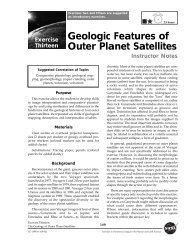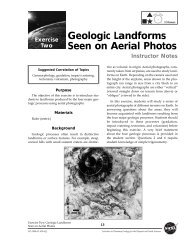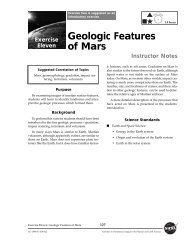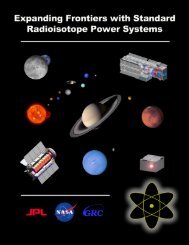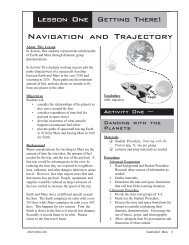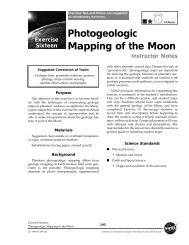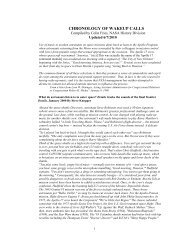Vision and Voyages for Planetary Science in the - Solar System ...
Vision and Voyages for Planetary Science in the - Solar System ...
Vision and Voyages for Planetary Science in the - Solar System ...
Create successful ePaper yourself
Turn your PDF publications into a flip-book with our unique Google optimized e-Paper software.
1<br />
Introduction to <strong>Planetary</strong> <strong>Science</strong><br />
How do planets <strong>for</strong>m? What comb<strong>in</strong>ation <strong>in</strong>itial conditions <strong>and</strong> subsequent geologic, chemical,<br />
<strong>and</strong> biological processes led to at least one planet becom<strong>in</strong>g <strong>the</strong> abode <strong>for</strong> <strong>in</strong>numerable life<strong>for</strong>ms? What<br />
determ<strong>in</strong>es <strong>the</strong> fate of life on a planet? Such scientific enquiries reflect a basic human need to underst<strong>and</strong><br />
who we are, where we came from, <strong>and</strong> what <strong>the</strong> future has <strong>in</strong> store <strong>for</strong> humanity. “<strong>Planetary</strong> science” is<br />
shorth<strong>and</strong> <strong>for</strong> <strong>the</strong> broad array of scientific discipl<strong>in</strong>es that collectively seek answers to <strong>the</strong>se <strong>and</strong> related<br />
questions.<br />
THE MOTIVATIONS FOR PLANETARY SCIENCE<br />
In <strong>the</strong> past, scientists only had one planet to study <strong>in</strong> detail. Our Earth, however, <strong>the</strong> only place<br />
where life demonstrably exists <strong>and</strong> thrives, is a complex <strong>in</strong>terwoven system of atmosphere, hydrosphere,<br />
lithosphere, <strong>and</strong> biosphere. Today, planetary scientists can apply <strong>the</strong>ir knowledge to <strong>the</strong> whole solar<br />
system, <strong>and</strong> to hundreds of worlds around o<strong>the</strong>r stars. By <strong>in</strong>vestigat<strong>in</strong>g planetary properties <strong>and</strong> processes<br />
<strong>in</strong> different sett<strong>in</strong>gs, some of <strong>the</strong>m far simpler than Earth, we ga<strong>in</strong> substantial advances <strong>in</strong> underst<strong>and</strong><strong>in</strong>g<br />
exactly how planets <strong>for</strong>m, how <strong>the</strong> complex <strong>in</strong>terplay of diverse physical <strong>and</strong> chemical processes create<br />
<strong>the</strong> diversity of planetary environments seen <strong>in</strong> <strong>the</strong> solar system today, <strong>and</strong> how <strong>in</strong>teractions between <strong>the</strong><br />
physical <strong>and</strong> chemical processes on at least one of those planets led to creation of conditions favor<strong>in</strong>g <strong>the</strong><br />
orig<strong>in</strong> <strong>and</strong> evolution of multifarious <strong>for</strong>ms of life. These basic motivational threads will be built upon <strong>and</strong><br />
developed <strong>in</strong>to <strong>the</strong> three pr<strong>in</strong>cipal scientific <strong>the</strong>mes of this report—build<strong>in</strong>g new worlds, work<strong>in</strong>gs of<br />
solar systems, <strong>and</strong> planetary habitats—<strong>in</strong> Chapter 3.<br />
Current underst<strong>and</strong><strong>in</strong>g of Earth’s surface <strong>and</strong> climate are constra<strong>in</strong>ed by studies of <strong>the</strong> physical<br />
process operat<strong>in</strong>g on o<strong>the</strong>r worlds. The destructive role of chlorofluorocarbons <strong>in</strong> Earth’s atmosphere<br />
was recognized by a scientist study<strong>in</strong>g chemistry on Venus. Knowledge of <strong>the</strong> “greenhouse” effect, a<br />
mechanism <strong>in</strong> <strong>the</strong> ongo<strong>in</strong>g global warm<strong>in</strong>g on Earth, likewise came from studies of Venus. Comparative<br />
studies of <strong>the</strong> atmospheres of Mars, Venus, <strong>and</strong> Earth yield critical <strong>in</strong>sights <strong>in</strong>to <strong>the</strong> evolutionary histories<br />
of terrestrial planet atmospheres. Similarly, studies of <strong>the</strong> crater-pocked surface of <strong>the</strong> Moon led to<br />
current underst<strong>and</strong><strong>in</strong>g of <strong>the</strong> key role played by impacts <strong>in</strong> shap<strong>in</strong>g planetary environments. The <strong>in</strong>sights<br />
derived from studies of lunar craters led to <strong>the</strong> realization that destructive impacts have wreaked havoc on<br />
Earth <strong>in</strong> <strong>the</strong> distant past, <strong>and</strong> as recently as 100 years ago, a devastat<strong>in</strong>g blast <strong>in</strong> Siberia leveled trees over<br />
an area <strong>the</strong> size of metropolitan Wash<strong>in</strong>gton DC. Three recent impacts on Jupiter provide our best<br />
laboratory <strong>for</strong> study<strong>in</strong>g <strong>the</strong> mechanics of such biosphere-disrupt<strong>in</strong>g events. W<strong>in</strong>d-driven processes that<br />
shape Earth’s desert dunes operate on Mars <strong>and</strong> even on Saturn’s moon Titan.<br />
<strong>Planetary</strong> science transcends national boundaries. Even dur<strong>in</strong>g <strong>the</strong> depths of <strong>the</strong> Cold War,<br />
planetary scientists from both east <strong>and</strong> west frequently cooperated, by exchang<strong>in</strong>g samples from <strong>the</strong>ir<br />
respective lunar missions or by coord<strong>in</strong>at<strong>in</strong>g <strong>the</strong>ir <strong>in</strong>dependent missions to Halley’s Comet. Now,<br />
decades later, planetary science is a truly global endeavor. Spacecraft that explore <strong>the</strong> planets come not<br />
only from <strong>the</strong> United States, but also from Ch<strong>in</strong>a, India, Japan, <strong>and</strong> <strong>the</strong> nations of Western Europe. If we<br />
exp<strong>and</strong> <strong>the</strong> list to <strong>in</strong>clude nations with some space-based capacity—those that use spacecraft data, build<br />
spacecraft <strong>in</strong>struments, operate relevant ground-based facilities, or contribute <strong>in</strong> some o<strong>the</strong>r way to <strong>the</strong><br />
advancement of planetary science—planetary science encompasses <strong>the</strong> globe.<br />
PREPUBLICATION COPY—SUBJECT TO FURTHER EDITORIAL CORRECTION<br />
1-1



